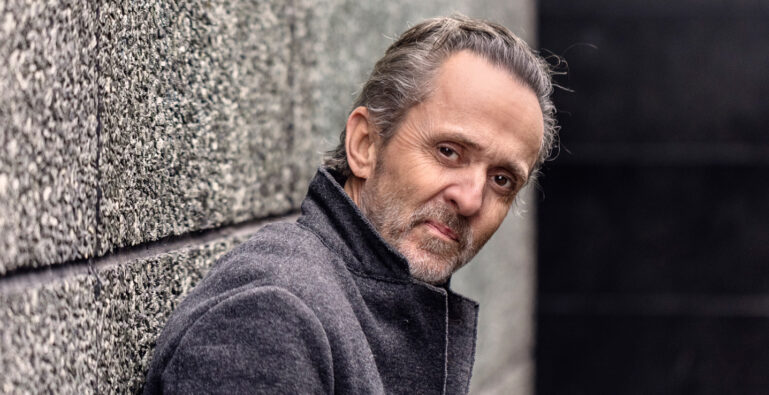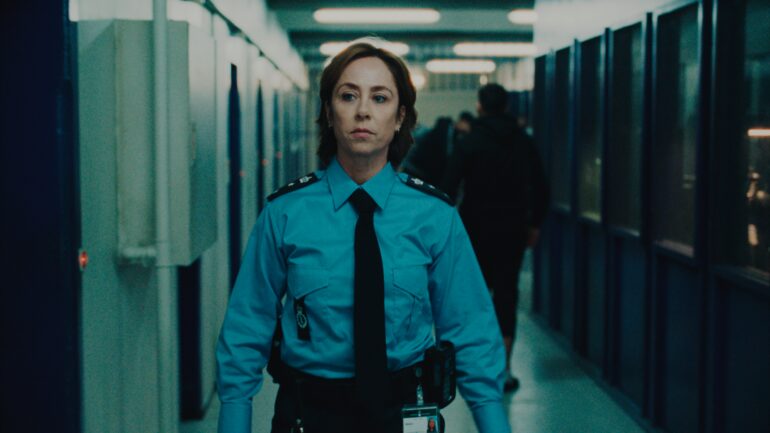WRITTEN BY: NFTVF
The multitalented writer and playwright Kim Fupz Aakeson elaborates on the psychology of a prison and how one skill benefits another.
Danish creator Kim Fupz Aakeson is nominated for the Nordisk Film & TV Fond Prize 2024 for his 6-part series Prisoner (Huset), based on his novel Fangeleg (2021). This is Aakeson’s second nomination for the award. In 2021 he was nominated for Welcome to Utmark (Velkommen til Utmark).
The winner of the award, which celebrates outstanding Nordic series writing, will be announced in Gothenburg on January 30th, 2024.
Prisoner premiered on DR in early September, 2023. The series is directed and co-developed by Michael Noer and Frederik Hviid, and produced by DR Drama.
What was your route to being a scriptwriter?
It was bit of a bumpy road. Initially, illustrating was my main focus, and I only started writing children’s books to feed that desire. But slowly the writing ran away with my attention and joy, and I ended up quitting the illustrations. I expanded into short stories and novels until the lonely working life as a writer got to me. So, living next door to the Danish Film School made it obvious to me that I should apply for the script division. I got in, and out again a year and a half later (it was that short back then in the 90s), and moving back and forth between books, plays, feature films and series has been working for me since then.
How do your many creative skills feed one another?
The different conditions and demands give me great diversity in my working life, the sovereignty of a literary text, the inspiration from the will of the other people involved in the moviemaking, ideas and notes. I bring the best of the worlds with me back and forth. It stretches my language as a writer to enter the stage and work on a play, to sit alone and have all the possibilities of a literary text, to respect and find a way through the limitations of a budget in a film.
What inspired your novel Fangeleg, which Prisoner is based on?
It was yet another bumpy road, actually. It all started when I read in the paper that the old iconic prison building would be emptied and eventually torn down. You don’t have such locations at hand very often, so I approached DR and was encouraged to write on that idea. I delivered a pretty extensive synopsis for a season, and was told that it was way too dark for the Danish audience. But having spent a good amount of time on the research, I turned the story into a novel, which came out in 2021.
At that point DR had a new management, so I gave it another try. I gave them the book, and bingo, times had changed, and the same tone was not too dark anymore.
How did the prison arena inspire the psychology of your characters imprisoned within themselves, and enable structuring a multi- character series through this unifying theme?
Being in a prison and having four prison guards as main characters fed the thought of freedom as a non-existing dream. All four of them can walk out and go home after work, but you cannot have a life without bars. Your body, your gender, your sexuality, your temper for a start, and every decision in life, takes a toll on your free will. Being a parent is a life sentence. Falling in love, having a partner… There are expectations to obey, bills to pay, obligations, commitments, promises to keep, and it helped us a lot in a show with so many characters and storylines to have a unifying theme.
How did your novelist and scriptwriter sides collaborate with each other, and others, during the series development?
The novel was a drama, and the environment did not at any point call for a lighter story. So together with the two directors, Michael Noer and Frederik Hviid, and our producer Rikke Kofoed, we took the book apart, added a fourth main character, created new storylines on the foundation, and initiated extensive research. We had prison guards connected, and asked two questions again and again: Has this happened? Could it happen?
In the fall of 2023, the drama series industry faced a crisis: Has this affected what is now commissioned, and how?
I am afraid so. What I hear from all the streaming services is an increasing focus on sports and reality shows, the safe bets, which means that the money is spent on this instead of on fiction. I do think that the players in streaming could benefit from looking more closely at the algorithms on behalf of courage, bravery and taking chances.
What could help Nordic creators best in 2024?
Money, bravery, and the courage to take chances.
Official trailer:
Read more about Prisoner and the other nominees: CLICK HERE.

